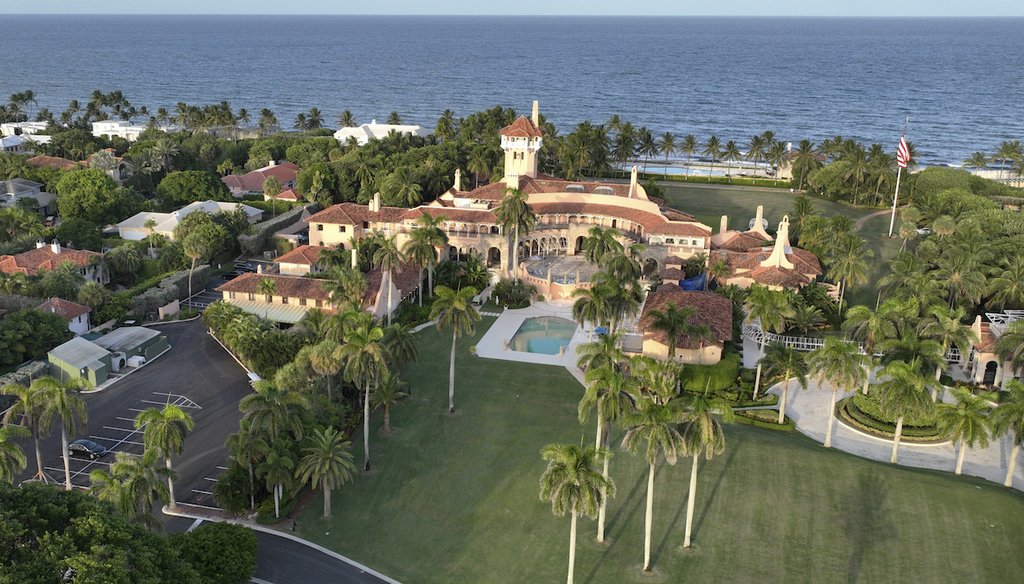Stand up for the facts!
Our only agenda is to publish the truth so you can be an informed participant in democracy.
We need your help.
I would like to contribute

An aerial view of President Donald Trump's Mar-a-Lago estate in Palm Beach, Fla., on Aug. 10, 2022. (AP)
An unsealed search warrant shows that the Justice Department suspects former President Donald Trump of violations of the Espionage Act. Additionally, the warrant that granted the FBI access to Mar-a-Lago says Trump is under investigation for concealing federal records, an offense that could be applied to obstructing justice charges.
The list of items taken by federal agents during the search include materials described as "various classified/TS/SCI documents." TS/SCI stands for top-secret/sensitive compartmented information. Separately, agents listed four sets of documents they described as "Miscellaneous Top Secret," and three sets described as "Miscellaneous Secret."
The warrant instructed agents to look for documents with classification markings, "communications, in any form, regarding the retrieval, storage, or transmission of national defense information or classified material" and "any evidence of the knowing alteration, destruction, or concealment of any government and/or Presidential Records."
A receipt of what they took also included the executive grant of clemency for Roger Stone, photos, a handwritten note and "info re: President of France." All told, agents carried away over 25 boxes of materials.
Attorney General Merrick B. Garland said that he personally signed off on the search warrant, which was approved by Judge Bruce Reinhart, a federal magistrate. Garland suggested that other methods of obtaining all documents had been unsuccessful.
The FBI searched Trump’s office and storage rooms or areas used by Trump or his staff for official documents that he should have left with the National Archives when he left office.
Amid backlash from Trump and his allies, Garland asked the court to unseal the search warrant and the list of items federal agents took during the search. Trump did not object. Prosecutors did not ask the court to unseal the underlying affidavit, which would have more details and reveal a road map for their investigation.
The Justice Department investigation pertains to official documents brought from the White House to Mar-a-Lago. The National Archives confirmed in February that it had communicated with Trump representatives in 2021, which resulted in the transfer of 15 boxes in January, including classified national security materials. The National Archives alerted the Justice Department because it is against federal law to remove official records.
Trump said on Truth Social that it wasn’t necessary for the FBI to show up. "They could have had it anytime they wanted — and that includes LONG ago. ALL THEY HAD TO DO WAS ASK," he said.
Here’s what we have published so far about the Aug. 8 search on Mar-a-Lago and the Justice Department’s investigation. We contacted Trump lawyer Drew Findling but did not receive a response.
Could Trump argue he declassified the documents found in the Mar-a-Lago search?
If the federal government pursues legal action against Trump over document laws, one obvious defense for Trump might be that he declassified these documents before leaving office. Sitting presidents do have wide powers to declassify documents, but they are supposed to go through a detailed procedure to do so. This case is so unprecedented that experts urge caution before projecting how courts may respond to such an argument. One key point is that presidential declassification power does not continue once a president is out of office.
Can Donald Trump run for president if charged and convicted of removing official records?
It is a federal crime to willfully remove or destroy official records, punishable by prison time. Federal statutes say that individuals convicted of this crime are barred from holding any office. But some legal scholars say that statute can’t be used to bar Trump from a 2024 presidential bid because it is trumped by the Constitution, which does not list criminal history as a disqualifying criteria to run for president.
Does anyone actually get arrested for mishandling White House records? PolitiFact’s review found that few allegations in previous administrations led to prosecution, and even fewer led to a conviction.
Comparing Hillary Clinton’s emails and Donald Trump’s boxes of files
Trump contrasted his situation with what happened to Hillary Clinton, whose use of a private email account for exchanges with her staff during her time as secretary of state drew an FBI investigation during the 2016 campaign. In Trump’s retelling, the FBI went easy on Clinton while aggressively pursuing him for having similar issues with classified material. But the presence of classified information in Clinton’s emails was less obvious than it was for Trump. Although the emails referred to information that other agencies said later that they considered classified, no information was clearly marked as such. The Clinton email chains included moments when participants skirted certain details in their discussions because they saw them as classified.
Comparing the search of Mar-a-Lago to the Watergate break-in of the DNC
Trump compared the FBI’s search of his estate with when operatives broke into the Democratic National Committee. They aren’t similar. "Watergate was a burglary," one expert told us. "It was illegal, done in secret, with no authorization. Comparing the two is like saying there is no distinction between someone who goes to a bank, writes a check, and properly withdraws their money and someone who puts on a mask and robs the bank at gunpoint."
Why Trump is wrong to suggest Obama personally kept ‘33 million pages of documents’
Trump said, "President Barack Hussein Obama kept 33 million pages of documents, much of them classified. How many of them pertained to nuclear? Word is, lots!"
Trump is wrong. News reports starting in 2016 showed that the National Archives and Records Administration would oversee transfer of Obama’s presidential records. The agency announced it would digitize the records and that classified records were sent to a facility in College Park, Maryland. Obama does not have them. We rated this statement Pants on Fire.
RELATED: Unpacking the theory that the 14th Amendment could keep Donald Trump out of the Oval Office in 2024
Our Sources
U.S. District Court Southern District of Florida, Unsealed warrant, Aug. 12, 2022
Attorney General Merrick Garland, Remarks, Aug. 11, 2022
Washington Post, Event venues (like Trump’s Mar-a-Lago) are not good places to store nuclear secrets, Aug. 12, 2022
Wall Street Journal, FBI recovered 11 sets of classified documents in Trump search, inventory shows, Aug. 12, 2022
CNN, Timeline: The Justice Department criminal inquiry into Trump taking classified documents to Mar-a-Lago, Aug. 12, 2022
See individual stories for additional sources























































